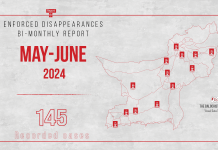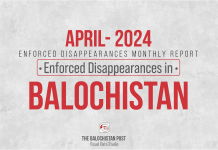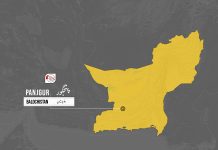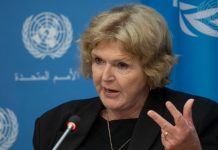What is BSO-Azad?
The Baloch Students Organization has always played a crucial role in the politics of Balochistan. This organization came into being with a different name – Baloch Students Educational Organization – in Karachi in 1962 with the dual aim of politically and nationally enlightening the Baloch youth and struggling for their due rights by assembling them on a common platform. The addition of the word “educational” in the name of the organization is considered a consequence of Ayub’s authoritarianism, as student politics was banned during his regime. Changez Alyani was elected as the first chairman of this organization in 1962.
The word “educational” was slashed from the name of the organization on 27th November 1967 and it was renamed as “Baloch Students Organization”. The first Council Session of the organization was also convened the same year. In this session, Dr Abdul Hayye Baloch was elected as the first chairman of the organization and Bezan Baloch as its first Secretary-General.
BSO’s history is chequered with struggles and sacrifices, but it has a long history of internal conflicts as well. These conflicts raised their heads in the very first session of the organization. Dr Hayye and his comrades had an affiliation for a newly formed nationalist party – the Awami National Party – whereas the former Secretary-General Abdul Raheem Zafar, Amanullah Gichki and others gravitated more towards the Peoples’ Party. This political dissonance soon precipitated the bifurcation of the Baloch Students Organization in two separate groups – the BSO-Awami, and the newly formed BSO-Anti Sardar. This division paved the way for several other divisions in the future.
BSO-Anti Sardar lost its inclination for the Peoples’ Party in 1972. A new session was convened where Taj Baloch was elected to lead the organization. In the meantime, the other faction, BSO-Awami, convened their session in the Urdu College Karachi where Abdul Nabi Bangulzai – an influential figure of the ongoing Baloch struggle – was elected as the chairman of the organization.
In the year 1974, the factions of the BSO met to negotiate and end their differences and decided to reunite into a single organization and call together a joint Council Session, which then elected Ayub Baloch as the Chairman and Yaseen Baloch as the Secretary-General of the BSO.
BSO functioned as an active organization till 1986, and the Council Session of the organization elected Yaseen Baloch as the Chairman of the organization. But at the same differences appeared within the organisation and following these differences, Kahoor Khan cleaved BSO and a new faction by the name of BSO-Sohb came into being in 1987.
The 1990s were marked by fragmentations, internal conflicts and petty politics, and are, therefore, reckoned by many as the dark era of BSO’s history.
The formation of BSO-Azad:
A major development in the history of the BSO occurred in February 2002, when the senior Vice-Chairman of the BSO Dr Allah Nazar Baloch and his comrades boycotted the Council Session being held by BSO-Mehrab. He justified this act by saying that then BSO Chairman Nadir Qudoos had developed an affiliation for the Pakistani parliamentary political parties, and had derailed from the core principals of BSO. With an inclination for independence and non-parliamentary politics and a commitment of upholding the independent status of the BSO, Dr Allah Nazar decided to hold a separate Council Session where the BSO-Azad came into being and he was elected as its first chairman.
Other than BSO-Mehrab and BSO-Azad, two other factions of BSO were also operating – BSO-Mengal, which was a sympathizer of BNP-Mengal, and BSO-Istaar, an admirer of the BNP-Awami. Within a short period, the BSO-Istaar Chairman Hameed Shaheen Baloch decided to reunite with BSO-Azad, which then led to the organization being renamed as BSO-Muttahida. The first Council Session of the organization was convened in Panjgoor, where Dr Imdad Baloch was elected as its Chairman and Saeed Yousaf Baloch as its Secretary-General.
After the merger of BSO-Azad and BSO-Istaar, the BSO leaders once again started a series of negotiations and unanimously agreed to consolidate all the factions into a single organization, but this “single” BSO lasted for a very brief period. Even before the first Council Session of the organization, Wahid Rahim Baloch split the organization into two – BSO and BSO-Pajjar.
In 2006, a Council Session of the BSO was convened in Quetta where Basheer Zaib Baloch was elected as the Chairman, Sangat Sana Baloch as the Vice-Chairman and Gulzar Baloch as the Secretary-General. Once again, the session gave rise to conflicts and differences of opinion. Mohi-Ud-Din created his own version of the BSO, and the Single BSO once again adopted its old name – BSO-Azad.
In the next Council Session of the BSO-Azad in 2008, Basheer Zaib Baloch was reelected as its Chairman and Zahid Baloch as its Secretary-General. Owing to the difficult circumstances, BSO-Azad had to wait for four years to call together its next Council Session. Then in the 19th Session in 2012, Zahid Baloch was elected as the Chairman of the organization and Raza Jahangir as its Secretary-General. According to BSO-Azad, Chairman Zahid Baloch was abducted by the Pakistani intelligence agencies on 14 March 2014 and remains to be discovered. Secretary-General Raza Jahangir was killed by the security forces in Turbat during a raid.
The 20th Council Session of BSO-Azad was convoked in 2015, where Karima Baloch was elected as its Chairperson and Sana Baloch (alias Izzat Baloch) as its Secretary-General. Karima Baloch was the first woman to lead the Baloch Students Organization.
The 21st Session of the organization was convened in 2018 where Sohrab Baloch was elected as the Chairman. On November 3rd this year, BSO announced that it has convened its 22nd Council Session where Abram Baloch has been elected as the Chairman and MehrZaad Baloch as its Secretary-General.
Who is Chairman Abram Baloch?
Abram Baloch is the eighth Chairman of the Baloch Students Organization Azad. He started his political career from his days in the school, at a time when the fifth wave of “independence struggle” had begun and had spread throughout the Balochistan. Abram Baloch comes from an area of Balochistan that has always been politically active, and, therefore, he had the opportunity to participate in the programs, assemblies and sessions of the various organization since his childhood. This is where his political training began.
Abram Baloch began his political activities from the BSO-Azad platform in 2008 when the organization was holding its Council Session, but he was not a member of the organization – he acquired the membership a year later in 2009. Due to his active participation in the activities of BSO-Azad, he was selected as the Deputy Unit Secretary of his unit of BSO the same year in December; he also served as the Unit Secretary.
In 2010, his unit was dissolved into a Zonal Organizing Committee, and he became a member of the organizing body for the first time. He completed his matriculation in 2011 and was elected as member of the newly-formed cabinet of the zone.
The state-sponsored crackdown on the BSO-Azad had begun in 2009. Zakir Majeed Baloch, the Vice-Chairman of the organization, was abducted and remains missing to this day. BSO workers and members were being killed and detained en masse on almost daily basis. In March of 2013, BSO-Azad was banned by the Pakistani authorities. In the words of Chairman Abram Baloch, this was “a difficult and challenging time for BSO-Azad, but the far-sightedness, determination, and prudence of its leadership never let the courage of the members to waver. This political period and the adversities it bestowed on us were a source of our tutelage and training, which then empowered us to face the subsequent adversities. The principal of my political training came from this period.”
Due to the state-sponsored crackdown on the BSO-Azad, the organization had to adapt to the new circumstances by overhauling its entire structure. It was reorganized around the new “cell system” in 2011, and owing to the reorganization, Abram Baloch was elected as the Zonal Cell Organizer.
He then served on various echelons in the BSO-Azad and was elected as its Chairman in the 22nd Council Session this year.
A meeting with Chairman Abram Baloch:
Abram Baloch remains anonymous in the media, and this interview is conducted in such a way that his identity remains hidden. After contacting various sources, The Balochistan Post (TBP) finally arranged an interview with him in an undisclosed location, where he forbade any kind of photography. He wore a mask throughout the interview, and when inquired about the reason, he said that the covering his face has more to do with protection from the Pakistani armed forces than from the coronavirus. He gave the example of the former BSO Chairman Zahid Baloch who gave an interview to BBC without covering his identity – he was detained a few weeks later by the security forces and remains missing to this day. In the interview, he had made it clear that his organization is only a student organization that believes in peaceful struggle, but he wasn’t spared.
Questions & Answers:
TBP: First of all, we congratulate you on being elected as the Chairman of the BSO-Azad and thank you for agreeing to talk to us.
Abram Baloch: I also thank The Balochistan Post for coming here to listen to our stance.
TBP: We can see that for more than a decade, the BSO-Azad has been under the state-sponsored crackdown, and the organization was also banned in March 2013. How difficult is it for an organization to maintain democratic practices? What difficulties did you face in convening the Council Session?
Abram Baloch: It would probably be impossible to describe the difficulties we had to confront in convening the Council Session in words. Balochistan has been completely transformed into a war-stricken zone. A minor political activity cannot be conducted freely here. In these conditions, it was extremely difficult for us to convene a large organizational program like a Council Session. But the visionaries of our organization toiled day and night and, despite all the hardships, made it possible to call together the Council Session. This feat not only reflects the democratic institutions within the BSO but also communicates the commitment of our members to the organization and its ideology. This organisational structure and the ideological commitment is the fundamental reason why BSO-Azad is still active and working, despite the state actions against it.
TBP: How is BSO-Azad any different from other Baloch students organizations?
Abram Baloch: BSO has been through many ups and downs in the 53 years of its existence. It promoted the calls for independence of Balochistan, and it also endorsed the fraudulent slogans of provincial sovereignty. Coastal, mineral and other superficial and misleading agendas were also a part of its journey. Every newly elected chairman used to add his name to BSO and then attempt to alter its programme and objectives. BSO also remained under the influence of groups and parties at times. But in 2002, the ideological and visionary comrades decided to liberate BSO from the aegis of parliamentary parties and rid it from superficial outdated objectives and set it towards its actual purpose. These comrades then laid the groundwork for BSO-Azad.
Two decades have elapsed, and today, I am its eighth chairman, but BSO-Azad has not divagated from its actual objectives, and neither the election of a new chairman or new cabinet has brought any change in it. The reason behind this is the selection of an ideologically explicit path.
BSO-Azad is different from other student organization as an explicit vision behind its aims, ideology and conduct. BSO-Azad does not deceive Baloch students into believing in mendacious shibboleths or unrealistic promises; instead, it keeps them informed on the real issues and provides them with a platform for struggling against national servitude, understanding the real history and national enlightenment.
TBP: The membership of BSO-Azad does not provide the usual protection to the students as the membership of other student organizations does; instead, it further puts their lives in jeopardy. In this scenario, why would any student be a part of BSO-Azad?
Abram Baloch: That depends on how you interpret ‘protection’? We believe that BSO-Azad is the only organization that protects the students in the truest sense. If by the protection you mean the provision of conventional student dormitories, students threatening their way through examinations, and the provision of roads and cunettes, then neither our attention nor our interest is focused on this kind of protection. But we can proudly say that BSO-Azad is the intellectual protector of the Baloch students – it is preserving the ideology of independence and development in the students. We protect the emotional commitment of the students and prevent their usage for the personal gains of a person or a leader. BSO-Azad shields the students from intellectual exploitation, the negative effects of the colonial education system, and encourages critical thinking in them. Above all this, BSO-Azad serves as the protector of the posterity and the independent future.
It should be kept in mind that the Baloch students are a generation of war; they’ve been raised in the times of war. Today’s national movement itself is training the students. In these circumstances, state-sponsored tyranny and dread have no meaning for the Baloch youth. Today’s students have witnessed all forms of brutality, like enforced disappearances, kill-and-dumps, the mistreatment of women and children and destruction of villages. The current generation of Baloch students is highly conscious, and this generation won’t be deceived by duplicitous promises and superficial slogans.
This generation knows its true struggle and organization. This is why no kind of state-sponsored oppression and brutality has been successful in deterring these students’ participation in BSO-Azad.
TBP: BSO-Azad has been declared a banned organization; hundreds of its members and leaders are missing and many have been killed. The remaining part of the organization has been forced to remain underground and operate for almost a decade now – far from academic institutions and schools. Is BSO-Azad still a student organization? Or do you have any mechanism or strategy to communicate your message to the Baloch students?
Abram Baloch: The attempts of uprooting a political party or movement are made only if it is bringing a real change, and if its activities are a source of dread for oppressive, usurping and authoritarian powers – meaningless rhetoric does not earn the baton. BSO-Azad is under rebuke and cannot operate openly on the ground, not because we are incapable, but because our activities are potent and can influence the students. As long as these capabilities are embedded in our organization, ideology and conduct, BSO-Azad won’t be able to operate openly like conventional student organizations. When we’ve lost our influence, then we would do everything that dozens of inconsequential student organizations can do openly and in academic institutions.
Throughout the world, a majority of student organizations have weathered through such difficult and challenging times. But the existence of a revolutionary ideology and explicit objectives are the hallmarks of a well-organized and successful organization.
Despite all the state-sponsored tyranny and oppression, BSO-Azad is still present and active among several academic institutions of Balochistan and Pakistan. As a student organization, BSO-Azad is also intellectually training the students in these institutions, and also providing an organized platform to shield them from duplicitous slogans.
In contrast to the anachronic conventions of the past, BSO-Azad is shaping its conduct and policies according to the rules and principles of the revolution, and forcefully implementing them.
TBP: State agencies accuse your organization of not being a student organization, but a facilitator or even an offshoot of the pro-independence, armed organizations. Is there any truth in these accusations?
Abram Baloch: If this is the case, then why are our members and leaders being abducted and disappearing from hostels and academic institutions, but not from the mountains? Our organization has been a victim of state-sponsored oppression and brutality for a decade now. The state has been levelling such accusations as an attempt to conceal its tyranny and justify the crackdown on BSO-Azad.
Almost everyone in Balochistan –from the students to the conscious general public – knows that these allegations have no truth whatsoever.
BSO-Azad is a peace-loving, pro-independence organization which is struggling for the education and training of the students in academic institutions and inclining them towards enlightening activities. Acquiring freedom through peaceful politics is a fundamental political right of every human being. The civilized nations of the world allow it, and not consider it tantamount of extremism or terrorism. This is the freedom of expression, and Scotland and Catalonia are its quintessential examples.
TBP: As the new chairman of the organization, on which new paths would you like to lead the organization? Would you formulate new policies? Or are you satisfied with your previous performance?
Abram Baloch: The revolutionary workers of a revolutionary movement, instead of being completely satisfied with the policies and political conduct of their organization, always ponder and critically analyze on them. They hold political dialogues and debates so that they can employ the latest and up to date strategies to achieve their goals and adapt themselves to the demands of the time.
To achieve their goal, revolutionary organizations keep altering their policies to assimilate themselves to the circumstances of the time; we are also practicing this revolutionary strategy. We ponder the weaknesses of the organizations and highlight them in our assemblies so that we can bring the required changes in our policies and conduct, and carry out our struggle in the most organized way.
Being the newly elected chairman of the organization, I am also obliged to follow this strategy. Whenever we feel that we need to change our strategy, we’ll discuss this with the relevant organizational institutions per the predetermined procedure.
TBP: Baloch students can be seen protesting, launching long marches, pitching hunger-strike camps, or rallying on the roads. Compared to the other students from the other nations of the region, the Baloch students are significantly active in protests. What could be the reason behind it?
Abram Baloch: Baloch students have comparatively more problems to deal with, and this is precisely why they are seen protesting for their academic rights every other day. There are no educational institutions in the majority of the areas of Balochistan. The few that exist are much underequipped compared to the other academic institutions of Pakistan and are plagued by hundreds of difficulties. The students that travel to different areas of Pakistan for studies also confront gazillions of issues.
But another fact is that the Baloch students are comparatively much more politically enlightened than the students from various other nations of the region. They are aware of their rights, and they cannot endure exploitation. When a Baloch student makes his way to a prominent academic institution with such aptitudes, he does not think only about his career but considers it his obligation to secure the rights of the other students of his nation, as he is well aware of their condition. This national and political consciousness is also a reason that wherever the Baloch students study, they can be seen participating in some kind of a protest or playing their part in a struggle.
TBP: It is said that in 2006, BSO-Azad gained popularity for five years among the Baloch students by raising the slogans of non-parliamentary politics and independence, but these calls have now died out – the students no longer have any interest in these objectives. This has incurred much more harm than the state-sponsored crackdown. Is there any truth in this?
Abram Baloch: There is no truth in this. For the past decade, BSO-Azad has borne the brunt of the state-sponsored tyranny. But today, we can say that – with the utmost confidence no complacency whatsoever – that BSO-Azad is the largest and most popular student organization in Balochistan. Even today, Baloch students are participating in BSO-Azad en masse.
If the political programme of BSO-Azad had died out, then it wouldn’t have been so popular among the Baloch students, and students wouldn’t have been acquiring its membership in such large numbers.
If this programme had died out, then such an intense, large-scale and long-lasting state-sponsored crackdown would have annihilated BSO-Azad. It is the reward of our revolutionary ideology that BSO-Azad is still the most popular and widely acknowledged student organization among the Baloch students.
The ideology of national freedom and non-parliamentary politics is not solely the ideology of the BSO-Azad, but that of the entire Baloch nation that raised its head from the womb of the servitude and exploitation of the Baloch. Several Baloch organizations have been working for this ideology under various names and through varying strategies. As long as the national servitude and exploitation exist, this ideology won’t fade away. BSO-Azad inculcated this ideology in the Baloch students and kept following it as a student organization through a specific procedure. This ideology might die out after the acquisition of independence, but not before it.
TBP: You call it the Council Session and select an election day, but in the past four Sessions, the administrators of your organization have had uncontested victories. Why?
Abram Baloch: We convene the Council Session per the principles of the organization and democratic values, where every counsellor of our organization has equal rights and a certain degree of authority. In the current circumstances of Balochistan, the student organizations which do not face any difficulties find it hard to call together a Council Session every two years. But on the other hand, BSO-Azad, despite having weathered intense crackdown from the state authorities, has maintained its democratic values and has convoked a Council Session every two years.
Talking of the uncontested victories, we can proudly say that BSO-Azad has rid itself from the anachronic political conventions of the past. In the past, the organization was frequently cleaved in two or ostentatious politics was practiced during the selection of the administrators. Every other BSO Council Session meant an internal conflict and the fragmentation of the organization. Today, in contrast, institutions within the organization play a key role in formulating policies for the Council Session and act accordingly so that the menace of fragmentation can be avoided.
But this certainly doesn’t mean that BSO-Azad has abandoned its democratic values; the Council Session is still convoked per these values, and every counsellor has the equal right to compete for a designation within the organization. The Council Session appoints an election commission, which then conducts the elections independently. Every counsellor has the right to submit forms for any designation in the organization. Frequently, one or several forms are submitted for every designation. The candidates hold a dialogue between themselves where, after negotiation, one candidate decides to step down in the favor of the other. This ensures that the past conventions of conflict are not repeated. Certain designations are frequently competed for, but this is also conducted fairly and transparently. Because this entire procedure is transparent, only the results make their way out of the organization.
We believe that that this is political consciousness and development of our comrades in BSO-Azad that they are ridding student politics of the anachronic conventions of the past and paving the way for new democratic values.
Afterword:
After a detailed conversation with Chairman Abram Baloch, we asked him if he wanted to convey a message to the students of Balochistan, what it would be. He ended the interview with the following words: “I would like to say to the Baloch students that the current generation of the Baloch nation was born at the time of war and the zenith of the movement; it has been trained by this war. This generation is the only generation of the Baloch history that will witness the decision of the future of their nation – whether it will be future of pride, prestige and independence, or that of a minority living in everlasting servitude. You are to protect the dignity of this nation and its revolution. If you kept yourself aloof from this land and this movement, the posterity will never forgive you.”






























